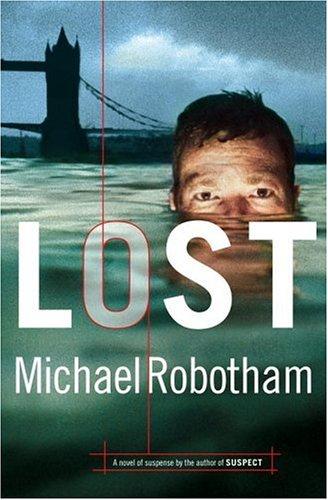Lost is the second book in the Joe O’Loughlin series. Written from the first person perspective of Vincent Ruiz, the Detective Inspector determined to find Joe guilty in Suspect, it commences with Ruiz clinging to a yellow buoy in the middle of the Thames, dazed, confused and shot.
Admitted to hospital and placed  in a coma, when Ruiz awakes, he has no memory of the events leading up to his immersion in the river or his wounds, only that it’s somehow connected to a previous case of an abducted girl, a Russian criminal, a child molester and a grieving mother.
in a coma, when Ruiz awakes, he has no memory of the events leading up to his immersion in the river or his wounds, only that it’s somehow connected to a previous case of an abducted girl, a Russian criminal, a child molester and a grieving mother.
With the help of his friend, psychologist, Joe O’Loughlin and a young policewoman, Ruiz has to not only piece together aspects of the old case, but recover his memories and discover who it is that’s not only trying to frame him for crimes he didn’t commit, but sabotage his career as well.
At first I didn’t think I was going to enjoy this book as much as I have the others in the Joe O’Loughlin series. For a start, I found it hard to get used to Ruiz as the first person point of view. His tone grated and I was still smarting from his attitude in Suspect (yes, I take these characters very seriously). However, as the novel went on, I became immersed in this psychological jigsaw, how the characters both divulged and withheld information, enabling or preventing Ruiz from discovering the information he so desperately needs. I also really enjoyed seeing Joe through Ruiz’s eyes, witnessing his admiration and the almost begrudging warmth he feels for a man he once tried to arrest. Gaining insight into Ruiz’s past as well as the relationship he has with his mother and children, why his marriages have failed and how he perceives himself were simultaneously poignant and downright tragic.
Once more, the prose is sharp, evocative and moving. Dialogue crackles and is often laugh out loud funny and wise-arse. Ruiz’s repartee is “take-no-prisoners” and yet, just as he can out-smart-alec the best of them, he’s also capable of deep compassion. Likewise, in seeing Joe from another perspective, we also come to learn how his insights really do nurture and support those he offers them to and the type of reliable and ethical friend he can be.
It was also nice to see Julianne through another man’s eyes as well as Charlie and Emma. But it’s in his fight for justice and peace of mind that Ruiz shines. Brave and loyal to a fault, there’s no risk he won’t take and literally no stone he’ll leave unturned.
As you would expect from the title, the notion of being “lost’ is a theme of the novel – from losing one’s memory, to a beloved, to one’s place in the world – as a part of a family, position in society or career. The converse of lost is “found” and it’s in the “finding” – the whys and wherefores of what is a physical, psychological and mental process – that the book draws its narrative trajectory, meaning and, ultimately, strength.
Terrific, this is a fast-paced book that gives a new and fuller picture of O’Loughlin’s world from a beloved character’s point of view.






